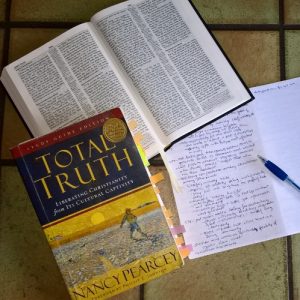This summer some dear ladies and I studied our way, together, through Nancy Pearcey’s Total Truth.
Never have I seen so much enthusiasm about a book besides the Bible. One of the ladies was still reading the introduction when she decided to buy her agnostic father a copy. Another one related how every significant conversation the previous week had involved this book. One explained how, during one section, she turned each page hesitantly, wondering what she would have to repent of next. And at least one husband was so deeply involved that the couple almost needed to buy an extra copy; another husband did not have to read it at all because the wife shared what she was reading, step by step. It was shared with children and friends, and it changed our lives.
Not to say that Total Truth is an easy read. We were all overwhelmed at times; even I was, though I’d read it twice before. One of the ladies said she was planning to reread it in the future, after she had bought a better dictionary. Another one is starting over immediately to be able to absorb it better. I’m hoping to reread it soon to try to figure out a way to make it accessible to teens. So, no, it is not easy to read, but we have found it to be worth every bit of effort.
So, what is Total Truth all about? I described it in an earlier review, but here is what I took from it this time:
North American Christianity is more about individual salvation than about the effect of Christianity on the culture, and this negative reality has significant roots as well as significant results.
- First Pearcey describes the two-level split we live by. Our society assumes there is a fact-based area of public truth (science, materialism, etc.) and a subjective area of religion, art, and values. She outlines where this idea came from, how it applies to various aspects of our world, its devastating effects, and how we can understand various other worldviews.
- Next she points out how our beliefs about origins affect everything else; she discusses problems with Darwinism, quoting accepted secular scientific journals. She also presents the idea that the universe is obviously and undoubtedly designed by a greater being, pointing out that this is the only way to overcome such a split in our lives and society.
- Then she discusses the history of evangelicalism, showing how much of our secular society today, including the two-level split, is related to non-biblical ideas accepted unquestioningly during the Great Awakenings, and how they apply to our families as well.
- Finally she points out that the goal of understanding the culture around us is to learn to live close to God, identifying and forsaking our personal idols and really learning to live by the truth that we can do nothing apart from God. In this way we will be able to reach out into our culture as ‘worldview missionaries,’ explaining our faith in ways that others will be able to understand.
We struggled through the thirteen chapters in three months. We had intense discussions, interspersed with laughter and encouragement, and learned much about God, this world, and ourselves. I often felt as though this book were taking up my whole summer, but what a good use of a summer it has been! How grateful I am for this opportunity!
As I was discussing Total Truth with friends, one of them, who knows Nancy Pearcey personally, said that she is not only ‘a brilliant mind’ but also a godly person who lives what she writes about. Someday in heaven, perhaps even sooner, I will meet this woman who has taught and encouraged so many by using her talents to God’s glory, sacrificing her own ambitions on the altar of obedience. Then I will be able to say a personal thank you.
Until then, I thank my earthly father, who handed out copies of this book to whomever would take one, the dear ladies who were willing to study it with me, and our heavenly Father who gave insight to the author and helped her, and us, learn to love him with our intellects as well as our hearts.
May we all learn to give up the idols of our hearts (Ezekiel 14:1-11), may God give each of us a heart of flesh (Ezekiel 11:14-21), and may we learn to boast only in the Lord (1 Corinthians 1:18-31). For, as Jesus said, “Whoever abides in me and I in him, he it is that bears much fruit, for apart from me you can do nothing.” (John 15:5b)
Soli deo Gloria—to God alone be the glory. Amen.
—
If you enjoyed this article, you might want to follow me on Google+ where I often mention helpful or interesting ideas, or connect with me on GoodReads where I share what I read.
—
This is yet another book in the in the 2017 52 Books in 52 Weeks Challenge and is also linked to Saturday Reviews, Booknificent Thursdays, Literacy Musings Monday, Raising Homemakers, and The Book Nook.

